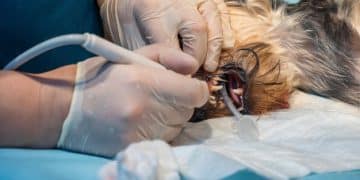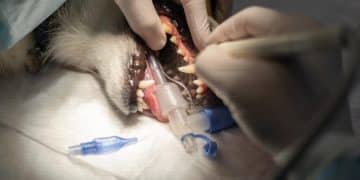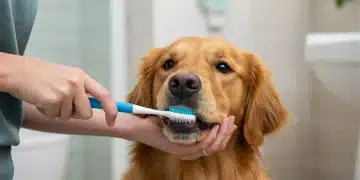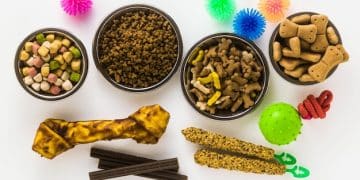Pet Dental Care: How Regular Cleanings Extend Your Pet’s Life
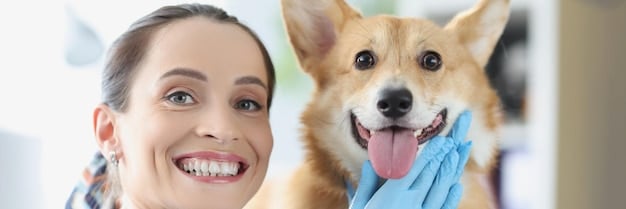
The Truth About Pet Dental Care: Why Regular Cleanings Can Add Years to Your Pet’s Life is rooted in preventing periodontal disease, which affects not only the mouth but also vital organs, making regular dental check-ups and cleanings essential for a longer and healthier life for your beloved companion.
Is your furry friend’s oral health a priority? Uncover The Truth About Pet Dental Care: Why Regular Cleanings Can Add Years to Your Pet’s Life, ensuring a happier and healthier companion for years to come.
Why Pet Dental Care Matters
Dental care is often overlooked when it comes to our pets’ health. However, maintaining good oral hygiene is crucial for their overall well-being and longevity. Neglecting their teeth can lead to serious health issues.
Understanding the importance of pet dental care can significantly improve your pet’s quality of life. Regular cleanings and check-ups are essential preventive measures.
The Link Between Oral Health and Overall Health
A healthy mouth contributes to a healthy body. Bacteria from dental disease can enter the bloodstream and affect major organs, such as the heart, liver, and kidneys.
Common Dental Problems in Pets
Pets can suffer from various dental issues, including plaque and tartar buildup, gingivitis, and periodontal disease. These problems can cause pain, inflammation, and tooth loss.
- Plaque and tartar accumulation can lead to bacterial infections.
- Gingivitis causes inflammation and bleeding of the gums.
- Periodontal disease damages the tissues and bones supporting the teeth.
Treating and preventing these issues requires consistent dental care and professional intervention when necessary. Simple steps at home can also go a long way in preventing dental diseases.
Ultimately, prioritizing your pet’s dental health provides them with a comfortable and healthy life while preventing potential serious health implications.
Recognizing Signs of Dental Problems
Identifying dental issues early can make a significant difference in your pet’s treatment and recovery. Being observant of their behavior and physical condition is key.
Knowing what signs to look for allows you to seek veterinary care promptly. Early detection can prevent minor issues from escalating into severe problems.
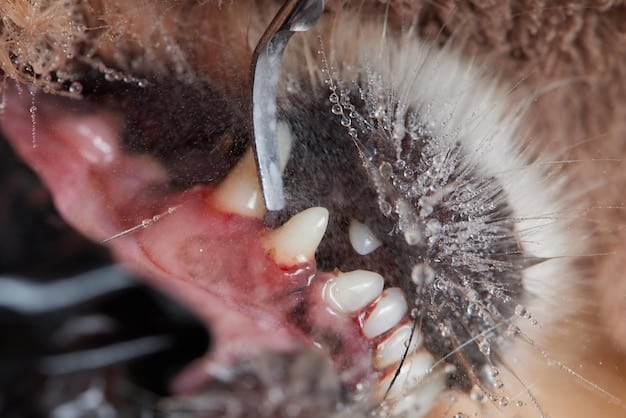
Bad Breath (Halitosis)
Persistent bad breath is often one of the first indicators of dental problems. It is usually a sign of bacterial buildup and infection in the mouth.
Changes in Eating Habits
If your pet suddenly becomes reluctant to eat hard food or starts eating more slowly, it could be due to dental pain or discomfort. They might also drop food while eating.
Excessive Drooling
Increased saliva production can be a response to oral irritation or inflammation. Excessive drooling is often accompanied by redness or swelling in the gums.
- Reluctance to chew on toys or bones.
- Swollen or bleeding gums.
- Pawing at the mouth or face.
- Loose or missing teeth.
Regularly checking your pet’s mouth for these signs can help you address potential problems early and maintain their dental health.
Paying attention to these signs will empower you to take quick action, which enhances treatment efficacy.
The Importance of Regular Dental Cleanings
Professional dental cleanings are an essential part of maintaining your pet’s oral health. These cleanings go beyond what you can achieve at home.
Regular cleanings help prevent the progression of dental disease and protect your pet’s overall health. They remove plaque and tartar that can’t be eliminated by brushing alone.
What Happens During a Professional Dental Cleaning?
During a professional cleaning, your veterinarian will perform a thorough examination of your pet’s mouth, followed by scaling and polishing to remove plaque and tartar.
Anesthesia and Your Pet’s Safety
Anesthesia is typically required for a complete dental cleaning. Your vet will assess your pet’s health and take precautions to ensure their safety during the procedure.
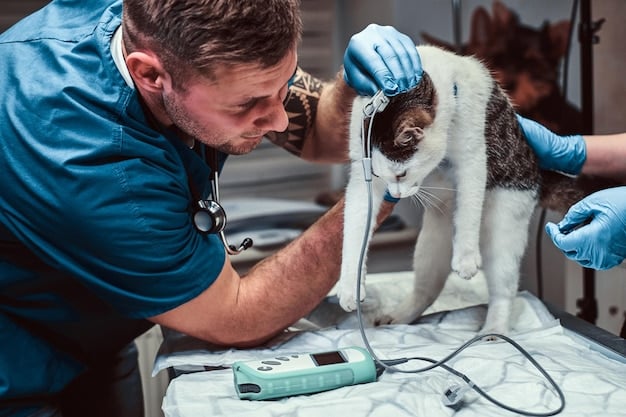
- The vet will examine for any signs of oral cancer.
- Digital X-rays of the teeth will identify problems below the gumline.
- Ultrasonic scaling will remove tartar above and below the gumline.
- Polishing to smooth the teeth and slow future plaque build-up.
Professional dental cleanings not only improve your pet’s oral hygiene but also allow your veterinarian to detect and address any underlying issues early. This promotes a healthier and happier life for your pet.
Investing in these services promotes long-term well-being and minimises potential complications.
Home Dental Care: Daily Habits for a Healthy Mouth
Complementing professional dental cleanings with a consistent home care routine is vital for maintaining your pet’s oral hygiene. Daily habits can significantly reduce the risk of dental disease.
Establishing a regular home dental care routine can help prevent plaque and tartar buildup, keeping your pet’s teeth and gums healthy. Consistency is key to achieving the best results.
Brushing Your Pet’s Teeth
Brushing is the most effective way to remove plaque and prevent tartar formation. Use a pet-specific toothbrush and toothpaste.
Dental Chews and Toys
Dental chews and toys can help reduce plaque and tartar buildup as your pet chews. Choose products that are safe and appropriate for your pet’s size and chewing habits.
- Start slowly and make brushing a positive experience.
- Use enzymatic toothpaste to aid in plaque control.
- Provide safe and effective dental chews.
- Consider using dental wipes for quick cleanings.
Incorporating these simple practices into your pet’s daily routine can greatly enhance their dental health. Remember, prevention is always better than cure.
These practices help prevent the onset of oral issues.
Choosing the Right Dental Products
Selecting appropriate dental products is essential for effective oral hygiene. Not all products are created equal, and some may be more suitable for your pet than others.
Understanding the different types of dental products available can help you make informed decisions. Ensure that you choose options that are both safe and effective for your pet.
Pet-Specific Toothpaste and Toothbrushes
Use toothpaste formulated for pets, as human toothpaste can be harmful. Choose a toothbrush with soft bristles that is appropriately sized for your pet’s mouth.
Safe and Effective Dental Chews
Opt for dental chews that are designed to promote dental health. Avoid hard chews that can damage your pet’s teeth or pose a choking hazard.
- Look for ADA-approved dental products.
- Avoid products with artificial colors and flavors.
- Consult with your veterinarian for recommendations.
- Read product reviews to ensure safety and efficacy.
By carefully selecting dental products that meet your pet’s specific needs, you can enhance their dental health and prevent potential problems. Always prioritize safety and quality when making your selections.
In short, doing your research and consulting your vet will guide your choices.
Diet and Dental Health
A balanced diet plays a crucial role in maintaining not only your pet’s overall health but also their dental health. Certain foods can promote or hinder oral hygiene.
Understanding how diet affects dental health can help you make better choices for your pet. A well-balanced diet supports healthy teeth and gums.
The Role of Dry Food vs. Wet Food
Dry food can help reduce plaque and tartar buildup due to its abrasive texture. Wet food, while easier to eat, can contribute to dental problems if not balanced with proper dental care.
Foods to Avoid
Avoid feeding your pet sugary treats or table scraps high in carbohydrates, as these can promote bacterial growth and lead to dental decay.
- Choose high-quality pet food with balanced nutrition.
- Offer dental-specific treats and chews.
- Limit sugary treats and table scraps.
- Ensure fresh water is always available.
By making informed dietary choices, you can support your pet’s dental health and overall well-being. A healthy diet combined with regular dental care will keep their smile bright and their body healthy.
Diet is an important, yet often overlooked facet of dental care.
| Key Point | Brief Description |
|---|---|
| 🦷 Regular Check-ups | Annual vet visits for professional dental cleanings. |
| 🪥 Home Brushing | Daily brushing to remove plaque and prevent tartar. |
| 🦴 Dental Chews | Safe chews to help reduce plaque and massage gums. |
| 🍎 Diet Choices | Balanced diet avoiding sugary treats for better dental health. |
Frequently Asked Questions
▼
Ideally, you should brush your pet’s teeth daily to prevent plaque buildup. If daily brushing isn’t feasible, aim for at least a few times a week to maintain good oral hygiene.
▼
While anesthesia always carries some risk, modern veterinary protocols and monitoring greatly minimize these risks. Your vet will assess your pet’s health thoroughly before.
▼
No, human toothpaste is not safe for pets. It contains ingredients like fluoride and xylitol that can be toxic if swallowed. Always use a pet-specific toothpaste.
▼
Signs include severe bad breath, difficulty eating, excessive drooling, bleeding gums, loose teeth, and facial swelling. Consult your vet immediately if you notice signs.
▼
Dental chews help reduce plaque and tartar through mechanical abrasion as your pet chews. Some chews also contain enzymes that help break down plaque and bacteria.
Conclusion
Taking care of your pet’s dental health is a crucial aspect of their overall well-being. By understanding the importance of regular cleanings, practicing good home care, and making informed choices about diet and dental products, you can significantly improve your pet’s quality of life and ensure they live a longer, healthier, and happier life. Prioritize their dental health and watch them thrive.
